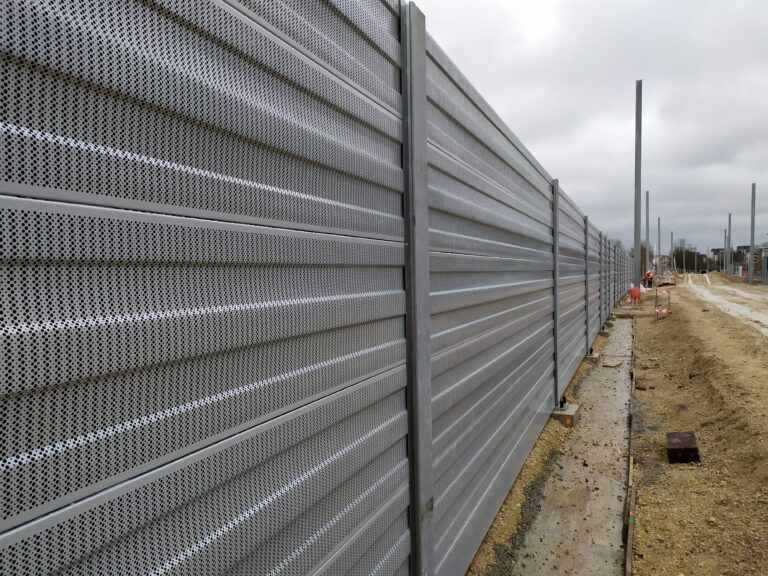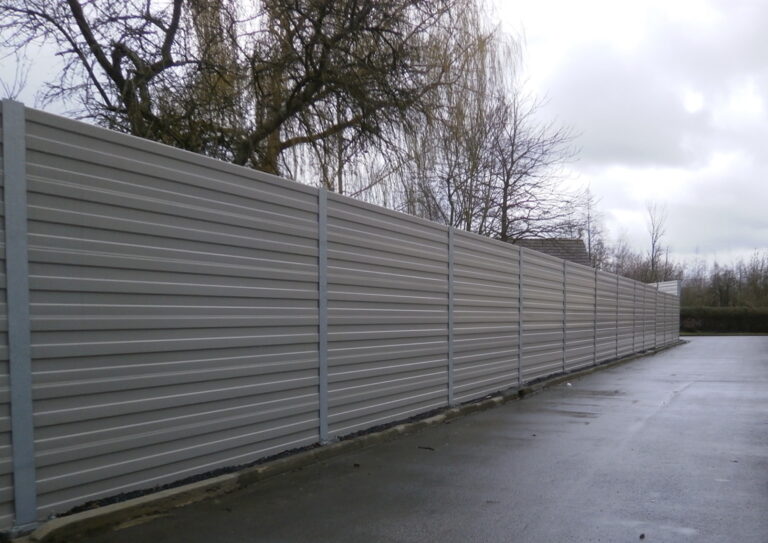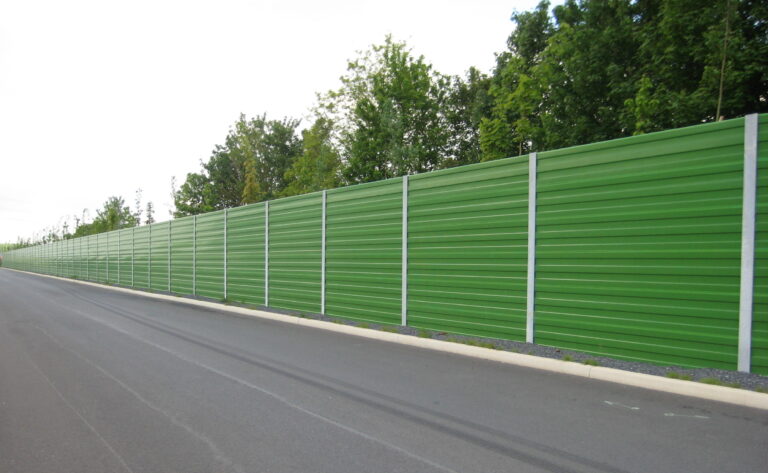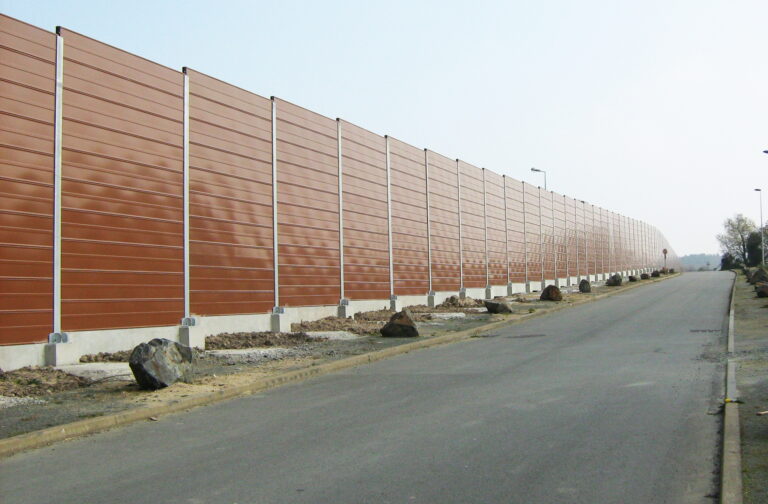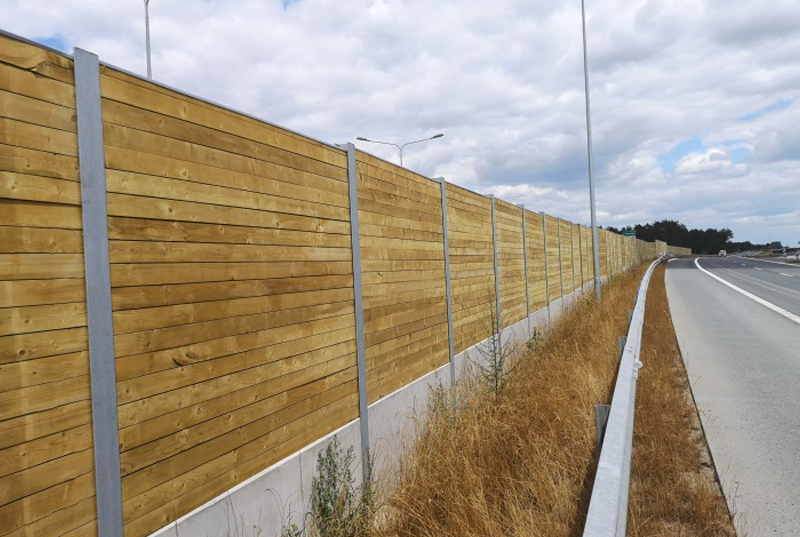METAL NOISE BARRIER – The solution against noise.
- Home
- Service
- MURS ANTIBRUITS en
- METAL NOISE BARRIER – The solution against noise.
Metal noise barrier
The metal noise barrier is made of painted galvanized steel or painted aluminum.
Our workshops can also design your walls according to the type of sheet metal desired.
Depending on the model of panel selected, we can offer acoustic performances
intrinsic isolation (DLr) up to 31dB and absorption (Dla) up to 12dB.
The vegetated noise barrier remains the most integrated solution with the surrounding vegetation to protect you from noise pollution.
Noise walls are an effective method of reducing noise in a poorly insulated room, although they are not very common. Today we will show you how to build a noise barrier with reclaimed materials and common tools, which can reduce noise levels by up to 50-70 dB.
1. What is a noise barrier?
Noise is a societal problem that requires an adequate solution such as noise walls. A noise barrier is a structure designed to reduce noise from a variety of environmental sources, such as background noise, impact noise and neighborhood noise (the most common). These walls can reduce noise levels by up to 40 decibels, thereby reducing noise and improving environmental quality.
Designing a noise barrier
A noise barrier must first and foremost be waterproof. This means that it must be able to prevent any noise from passing through. It is also necessary to prevent any water infiltration. To achieve this, the noise barrier must be constructed of a noise-blocking material, such as steel or concrete, for a sound protection level of 40 dB or more.
Using glass wool
The sound barrier can be made of various materials, including glass wool. This is a very effective material for attenuating external noise up to 30 to 40 dB.
Use natural materials
One of the characteristics of noise walls, besides their efficiency, is that they can be made of up to 5 different natural materials. This allows you to choose a type of material that fits well with your interior. For example, you can choose between wood, hemp concrete, sisal concrete, chestnut wood and another natural material.
Use of artificial materials
A noise barrier is a wall that can be built with artificial materials. This provides greater flexibility in the choice of materials. Thus, you can choose from a variety of blocks, bricks or stones for the construction of your noise barrier,
2. The different techniques to create a noise barrier
Noise barriers are very useful for people who live near a road, airport, train station or railroad. They can be used in two ways: to reduce existing noise and to prevent annoying or unwanted noise from the road or neighbors from entering your home. In this article, we will show you the different methods used by professionals to build a noise barrier that can reduce noise by more than 55 dB.
The installation of a noise barrier is often more expensive than a conventional wall
A noise barrier is more expensive to install, as it is necessary to ensure that no noise penetrates the wall. It must therefore be designed to be watertight and to withstand high intensity impacts, which is difficult to ensure for a medium height wall. It is therefore preferable to contact a professional, who will take care of everything and can offer you the best options available, with an optimal quality-price ratio.
A noise barrier can be constructed of several materials
A noise barrier can be built with several materials, such as steel, aluminum or concrete, which offer sufficient strength to ensure stability and prevent frequent falls.
It is possible to install a noise barrier made of bricks or stones
Bricks and stones are easy to install and use, which is one of their main advantages. As a natural material, they are very easy to work with. It is also possible to build a stone wall directly in the ground, but this solution is more laborious and can take up to 4 times more time and effort.
A noise barrier can be built with natural stones
In order to offer you the best possible protection against external noise, the use of natural stone is recommended. This will produce a much stronger wall than if it were constructed of concrete, for example, and also offers better quality and aesthetics, with up to 50% more strength than concrete,
3. The advantages of a noise barrier
Housing comfort is a determining factor for well-being and quality of life. Thus, noise from outside can be very present in private spaces, including traffic, bird and street noise. An effective and economical solution to this problem is the use of a noise barrier, capable of reducing exterior noise by up to 30 decibels.
Allows you to insulate your home
One of the advantages of a noise barrier is to isolate your home from the noise of your neighbors. This reduces the noise level by 20-30 dB, ensuring privacy and quiet.
Allows to counter noise pollution
One of the main advantages of the noise barrier is its effectiveness in reducing noise pollution. Noise walls are designed to reduce exterior noise by up to 15 decibels, significantly reducing noise pollution.
Allows protection from snow and rain
The sound barrier can have an additional function, especially in cold climate regions. Indeed, it can offer protection against snow and rain. This is one of the reasons why noise walls are increasingly found in cold climate regions, with an increase of nearly 20% in recent years.
Prevents heat loss
One of the advantages of a soundproof wall is the reduction of heat loss. This is especially beneficial if you have adjacent rooms, such as a living room, for example. The soundproofing wall can protect these rooms from the heat emitted by your heating system, which allows you to maintain a stable temperature in these rooms, and thus enjoy your living room or your dining room all year round at temperatures between 18°C and 21°C,
4. How to insulate a room with a soundproof wall
One of the most common problems in homes is noise transmission. It could be neighbors talking too loudly, a baby crying constantly, or a child playing with toys. Noise walls can help reduce or eliminate noise in your home. These walls are thicker than normal walls and are designed to absorb, dissipate and reduce the noise inside your home with an efficiency of up to 40 dB.
How to insulate a room with a soundproof wall
To insulate a room against noise, it is necessary to cover the wall with insulation. This reduces noise and improves the quality of sound insulation by about 10-15 dB. It is possible to use an insulating paste to cover the wall.
Which noise barrier to choose?
For a noise barrier to be effective, it must have a minimum thickness of 8 cm. Thus, the cost of a noise barrier can be relatively high. To know the price of a noise barrier, it is advisable to ask a qualified craftsman.
Soundproofing with an anti-noise wall
Sound insulation is one of the main elements of a noise barrier. It is therefore necessary to use a material that can achieve this. Thus, it is advisable to use foam insulation or metal insulation, which offer acoustic performances between 20 and 40 dB.
How to make a noise barrier?
An effective technique to insulate a room against noise is to build it in several sections. This reduces the weight and makes it easier to move. This method also offers the possibility of making changes more easily and cheaply.
How do you isolate a room with a soundproof wall?
Insulating a room with a sound barrier is possible, but requires the use of specialized materials. This will reduce outside noise, but at your own risk. It is therefore important to choose a material that is capable of effectively blocking sound from the outside and to ensure that the sound barrier is properly insulated with a minimum thickness of 10 cm.
Conclusion
A noise barrier can protect against noise pollution by retaining the noise inside a room and absorbing the noise at the wall. Different techniques can be used to build a noise barrier and the choice must be made according to the type of construction and the materials available. Studies have shown that the optimal result is obtained by combining several techniques. A good soundproof wall can improve indoor well-being. The construction of a noise barrier can be complex and it is advisable to call in a professional. Insulation work can be very tricky and it’s important to take the time to think things through before committing.

